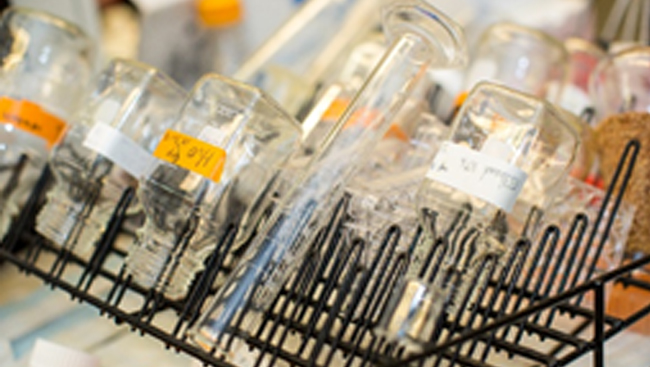
This resource was featured in the NeuroJobs Career Center. Visit today to search the world’s largest source of neuroscience opportunities.
There’s no one right way to set up a lab. From building a culture to purchasing supplies, determine what works best for you — and then run with it.
Tim Mosca, an assistant professor at Thomas Jefferson University, shares what he’s learned and observed from setting up and running his own lab, including one of the most important elements to success: Talk to people.
“Though it can feel like an isolating experience, as a new PI you’re not alone. There are people at your institution who have done it before you or who were hired at the same time as you,” he advises. “Listen to everything going on at your university to learn with whom you should talk.”
Read on for his lab setup checklist, which includes hiring and motivating staff, purchasing supplies, growing as a manager, and more.
Hire to Build a Strong Lab Culture
There is a very human element to our labs, which is just as important to nurture, grow, and develop as any other aspect.
Building a culture is all about identifying what's important to you. You run the lab. It's your name on the door. You are within your rights (politely, of course) to say, "This is how things will go.”
If you find people who are enthusiastic about and fit in with your culture, it will maintain itself. They'll believe in the mission of the lab, the vision you're selling, and the project they're working on.
Trust your gut when identifying different students or postdocs to bring in. Don’t be afraid to say, "You know, this person isn’t going to fit with the culture that I'm building at this time."
When it comes to finding qualified applicants, posting widely on large job boards, such as Cell Career Network, Science Careers, and Nature Jobs, can be helpful to reach a wide applicant pool. However, there are some considerations. You may get contacted by applicants who aren’t the right fit. For example, if you’re a neurobiologist, you may get a letter from a fungal biologist.
Job postings can also be expensive. Remember, the more you save at every step when starting a lab, the better. Most people have a lot more success using professional society boards, such as SfN’s NeuroJobs or Job Market through FENS. It more directly targets who you’re looking for, and it’s comparatively inexpensive.
Determine Lab Size and Composition
Determining lab size involves self-reflection. It's knowing enough about yourself and how you work to be able to make decisions about lab size, roles, and staff training levels when they join.
For example, you may say, "If I had only three people in the lab, I’d be bored out of my mind. I need eight to ten people to feel intellectually engaged. Of those eight people, I need someone who's going to cover the day-to-day administrative tasks for me, so I'm going to hire a manager.” On the other hand, if you have a certain way of managing the day-to-day details, then maybe you’ll do some administration, so others can focus on science.
If you know you're going to want to spend a lot of time training each individual person, starting with three or four people is going to be advantageous.
If you want to run a student-heavy lab, it could take more time to train at the beginning, and papers might be a bit slower. Conversely, you may get papers out faster with a mostly postdoc lab, but they may not bring in the same wide-eyed level of enthusiasm as first year graduate students.
Purchase Supplies and Equipment
When you're leaving your postdoc lab, take a walk around and write everything down. Walk through your normal day and take pictures of everything to create a repository of what you’ll need. Ask friends or colleagues for their start-up list of what they ordered. The new PI community is wonderfully willing to share. Ask what they had to buy and even what they forgot and had to order later.
Know you can give your supply list to multiple companies and say, "Whomever gets me the best price is who I'm going with." Also, many vendors have a new investigator program, so take advantage of those discounts.
There’s a tendency to not want to trouble a vendor by continually coming back with a lower price, but that's the nature of it. Remember, if they're still conversing with you, they're still in the game.
Seek Management Training
Not all places have management training protocols for new PIs, but there are resources available. For instance, NIH offers management training resources, the American Association of Medical Colleges has a management training program for early- and mid-career female scientists, and SfN via Neuronline offers a downloadable toolkit on leadership, management, and team building.
Again, it all comes back to using available resources and asking for help. Maybe you have a business school associated with your local neighborhood or university. Talk to them.
Even go to the business manager for your department and say, "I don't know as much as I’d like about ordering, hiring, or personnel management. Could you explain this to me as if I were a child, so I can absorb all of the knowledge that goes into this particular decision process?"
Motivate Your Staff
Keeping people motivated comes down to instilling ownership. Bring people into a project early and have a conversation along the lines of, "Let's define what needs to be done, and then let's think about what you’re interested in, what I’m interested in, and how we can merge those.” If you start engaging students and postdocs from the beginning, they're much more invested in what you're trying to do.
As a new PI, you have an opportunity to motivate your personnel since your success as a lab head is tied to their success as a trainee. Communicate that you’re deeply invested in their growth as a scientist, lab member, and as a future colleague.
When experiments don't go quite according to plan, as they tend to do, make sure there is enough investment and excitement to work through those times. If they’re not excited and invested, people drop projects. Remind them that failing is an integral experience in science. You always learn something new so that you can come back the next time with a better chance at success.
People are always the most important part of our labs. It's always important to ensure trainees and staff have an environment in which they can get along and excel scientifically to push back the frontiers of knowledge.
Speaker






